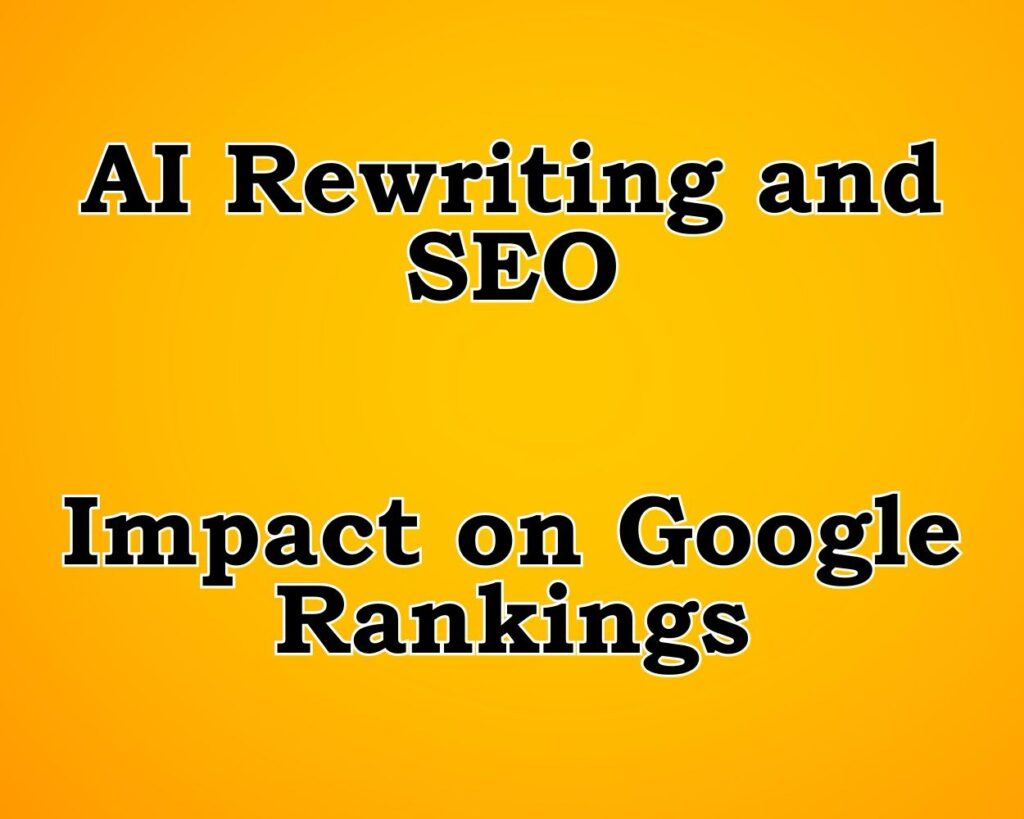Ethical and Legal Considerations
Before delving into the SEO implications, it’s crucial to address the ethical and legal aspects of using someone else’s content. Rewriting another author’s work without permission, even with significant changes, can raise plagiarism concerns. It’s always best to create original content or use content that you have the rights to.

SEO Implications
Even if the rewritten content is unique in terms of wording, it may still lack the originality that search engines like Google value. Google’s algorithms are increasingly sophisticated and can often identify content that offers little new value or perspective, even if it’s not a direct copy.
Rewriting Your Own Content with AI
Refreshing Existing Content
Using AI to rewrite and update your own content can be a valuable strategy. It allows you to refresh older articles, add new information, and keep your content relevant, which can positively impact SEO.
Maintaining Quality and Value
The key is to ensure that the rewritten content maintains a high standard of quality and provides genuine value to your readers. Google’s algorithms favor content that is informative, well-written, and engaging.
How Google Responds to AI-Rewritten Content
Quality Over Originality
Google’s primary goal is to provide users with the best possible search results. This means prioritizing content that is not only unique but also high-quality, informative, and relevant to the user’s search query.
Potential Risks
If Google detects that content is being mass-produced or manipulated using AI tools, it may be flagged as low-quality, which can negatively impact rankings. It’s important to remember that Google’s algorithms are designed to reward content that benefits users, not just content that is unique.
Best Practices
- Add Unique Value: Whether rewriting your own content or drawing inspiration from others, always aim to add unique value and insights.
- Focus on User Experience: Ensure that the rewritten content is engaging, well-structured, and provides a good user experience.
- Avoid Over-Reliance on AI: Use AI as a tool to aid content creation, but don’t rely on it exclusively. The human touch is still crucial for creating compelling content.
While AI tools like ChatGPT can be useful for rewriting and updating content, their effectiveness in SEO depends on how they are used. The focus should always be on creating content that provides real value to readers. Google’s algorithms are adept at identifying and rewarding content that meets these criteria. As with any SEO strategy, the key to success lies in balancing technology with genuine, quality content creation.
Q: How effective is AI in rewriting content for SEO purposes? A: AI can be a useful tool for rewriting content, especially for updating or refreshing existing articles. However, its effectiveness largely depends on how the rewritten content is used. AI-generated content should be reviewed and possibly edited by a human to ensure it aligns with SEO best practices, adds value, and maintains a natural tone.
Q: Will AI-rewritten content rank as well as original content on Google? A: Google’s algorithms prioritize content that provides unique value to users. While AI-rewritten content can rank well if it’s informative, engaging, and relevant, simply rephrasing existing content without adding new insights or value may not yield the best results. Original content typically has a better chance of ranking higher.
Q: Can using AI to rewrite content lead to penalties from search engines? A: If AI is used to mass-produce low-quality content or to manipulate rankings, it could be flagged by search engines, leading to penalties. It’s important to use AI responsibly and ensure that the content is of high quality and provides real value to readers.
For more insights into effective SEO practices and the use of AI in content creation, you might find the following articles from Web Tools Empire helpful:
As an Amazon Associate we earn from qualifying purchases through some links in our articles.




